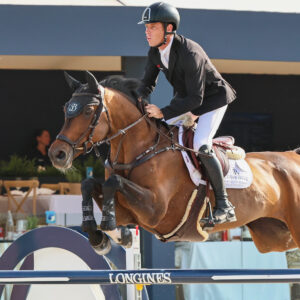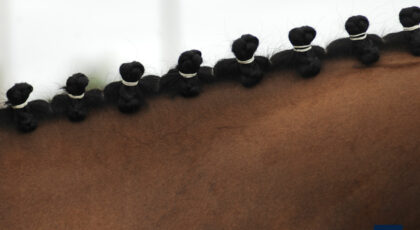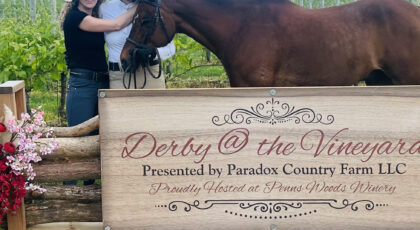When asked what kind of horse I dreamed about, I rarely answered an Andalusian, Friesian, Buckskin, or Blue Roan. I turned and said, “a broke one.”
When I finally bought a horse, I wanted something that made me feel safe. Something I could stick on a trailer, and we could go anywhere. Something, as old horsemen say, that had some miles on it.
Brandy, my first horse, is just that.
She has kept me safe on trail rides near semi-truck-invested highways and a host of dumb situations I have put us in. She isn’t a schoolmaster, but I love gloating as I watch her nap in her stall amongst the chaos of a competition. I have a video of her grazing quietly as the world’s largest combine rattles its way across the cornfield on the other side of the fence.
The older I get, the more I think a horse that stays calm in challenging situations is more impressive than one that capriole.
I used to judge people who had “over-horsed” themselves. The ones who got a horse that was way above their skill or confidence level, usually both. Nothing made me run away screaming from a conversation faster than a stranger telling me, “I bought a young horse so that we can learn together.” At horse shows, I would grimace when a horse seemed out of control in the ring. I prayed that everyone got through the class in one piece.
But there are a couple of things I realize now.
First, being judgmental is usually a bad life choice—we don’t know what we don’t know. There are a lot of reasons a horse could seem unmanageable. All horses, even Brandy, have bad days. And sometimes, we inadvertently cause them.
I once braided Brandy’s forelock for a dressage test only to have it to smack her in the face the whole test so she tossed her head through every movement. The judge took me aside afterward and asked me what was wrong with her.
Secondly, sometimes, our egos get in the way of making good decisions.
This is the point in the essay where I confess that I’m a member of “Over-Horsed Anonymous,” a select fellowship of individuals who, for one reason or another, have ended up with animals that make us realize how wildly unqualified we are.
With the exception of Brandy, all the animals in my life have appeared through the “Well, I guess they live here now” clause of pet ownership. My beloved orange tabby is mine because he wasn’t the right fit for the person who had him first. My partner drove our elderly Beagle a thousand miles to stay with us after his previous owner moved into assisted living. My second horse, Al, came to me the same way.
Originally, the plan was to take Al for the summer, learn as much as I could from him, and then sell him. He is an older gelding trained to third-level dressage. In videos he executes beautiful side passes, collections, and lead changes.
“He will teach you, and then you can teach Brandy,” my trainer mused.
Al needed someplace and someone that might be a better fit. On my preliminary phone call with his former trainer, I asked every question I could think of and hung up thinking, “I can handle this.”
I know I am not the only person who has found themselves in exactly this situation. No amount of background checks, pre-purchase exams, or crystal balls can save us all the time. Like dating, who we thought we were getting doesn’t always end up being who we got.
When Al got off the trailer, he was underweight and traumatized. He would stand stock straight in the crossties, terrified of making a wrong move. He would hide in the corner of his stall when I opened the door and panic at the sight of a ground pole when we did groundwork. He was big, fast, and had a mountain of baggage that came from who knows where. The old adage “a free horse is never free” bolted around my brain the way Al did on the longe line.
After he gained enough weight and muscle that he could be ridden, my trainer offered to ride him first. He danced around the mounting block and once she was on, Al tensed his neck and shoulders, as if waiting for something terrible to happen.
As the two trotted around me, I realized that I had become the exact kind of horse owner I had judged in other people: the owner of too much horse.
“When are you going to ride him?” my fellow boarders sometimes ask me.
I usually respond with a smile and say, “I am giving the best thing I can give him, time and consistency.”
With horses, anything done quickly will have to be redone. Going slow, I have learned, is the only way to really get anywhere.
It’s been a year since I unloaded Al off the shipping truck, and I have only ridden him once. While on the outside, I preach about the importance of time and patience, my insides often scream, and I beat myself up about my bad decisions.
The other day while fretting over why the heck I was keeping Al, I asked myself, “What if I am never able to ride him?” And just like that, I felt my blood pressure start to go down. I realized that the joy of owning a horse like Al is the privilege of watching him heal and flourish.
For Al, I had to brush off all the old natural horsemanship stuff I knew. Brandy thinks liberty work is dumb and would much rather be ridden, but Al loves it. We have spent hours and hours practicing switching gates, adjusting speed, and even coming in and stopping. Then, I trade in my dressage queen adult for my scrappy cowgirl teenage self, and the two of us practice standing quietly while other things go on around us.
Gone is the shutdown statue in the barn aisle. In his stead is a horse that is either begging for attention or half-napping as I use his favorite soft brush.
It’s been a year and we still have a long way to go. But we’ve made progress too. Al has revealed himself to be a talented and hilariously stereotypical bay gelding who is often ridiculously happy to see me.
Maybe being able to facilitate such a transformation is enough. At the very least, I have learned not to be so judgmental. Most of us, at some point, end up in over our heads.


 June 17, 2025
June 17, 2025 

























